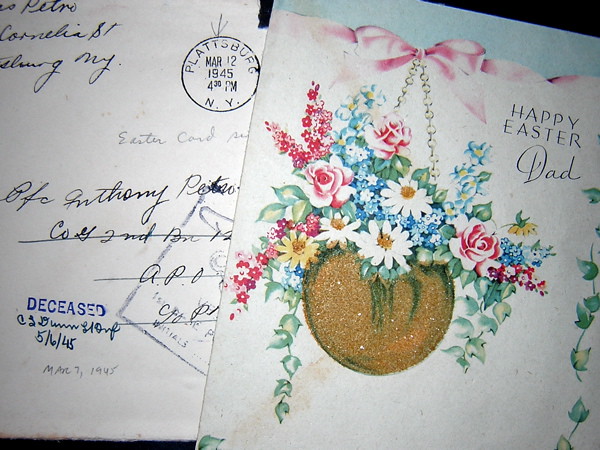Visiting my parents in September involved a treasure hunt, of sorts. On this visit my father, a born archivist, revealed binders upon binders of family documents that revealed lore I’d never known.
My father recently received a collection of letters from his brother (who had stored them for decades). The letters were written by their father to my Dad after Grandpa was drafted into the Army the spring of 1944. My grandfather could have received an exemption, because he had a family and was 38, but he felt it was his duty to serve. My father was 13 at the time; he turned 14 November 22 of that year. They corresponded while Grandpa was in basic training.
Grandpa was a blue-collar man; he worked in a paper mill. The family was not rich by any means. My grandfather had only an elementary education, so his writing rambled a bit without punctuation. But he was earnest, and he made the effort. I was touched by his reassuring my Dad that he didn’t have to work at his after-school job if he didn’t want to. He also urged my father “whatever you do go to school and see that the other kids go to help your mother and do as she tells you…” And at one point he admonished my father not to be mean to his siblings and to tell his sister to be good and help out, because “…if I can take all this stuff they hand out here the least you kids can do is be good.” That made me chuckle.

You will notice in this photo it says “Deceased” on the envelope. You see, my father sent an Easter card to Grandpa in 1945; it was postmarked March 12. My grandfather had been killed in action five days prior to that. It took two months for the Army to return the card. I imagined what my father felt to receive this, and I cried. His world cracked apart, and it altered his life forever.
My father offered the letters to me if I wanted them. I said yes with alacrity. He asked me later why it was so important to have all this documentation (I’d asked to have certain binders). My reply was that these binders are the most personal, tangible experience I will ever have of my paternal grandfather. They are precious to me. Like him, I’m a librarian at heart, so inheriting these archives feels right.
Sometime in the 1980s a man who had fought alongside my grandfather got in touch with my father. I read in his letters about my grandfather’s injury and death. This man wrote that they were fighting in Bolsdorf near Prum, Germany, in March 1945. Grandpa was shot in the groin and knee. Sulpha powder was applied and morphine administered; this was the only treatment available on the battlefield. The man wrote that the last he saw of Grandpa, he was being carried to the medic tent on a stretcher by two German POWs. My grandfather was giving the Germans “what for” because they were carrying him too roughly on the stretcher. He died shortly after. This friend wrote that my grandfather talked of his kids, especially a baby he’d not yet seen. And that my grandfather was brave; he never took a step backward. And that though his name was Anthony Petro, they didn’t call him Anthony or Tony. They called him Pete.
I’d never known all this.
My Grandpa fought and died in World War II. He left behind a wife and five children, the youngest a newborn. My father was the eldest; at age 14 he took on and shouldered the head-of-household responsibilities until he went to college. My grandfather’s sacrifice for his country and the ideal of liberty was my father’s sacrifice, and even that of his grandchildren. He served and died honorably. And this year, I met him. These mere documents will never be enough, but I’m grateful to have what I can.

